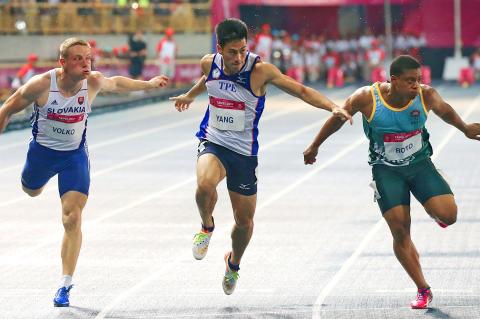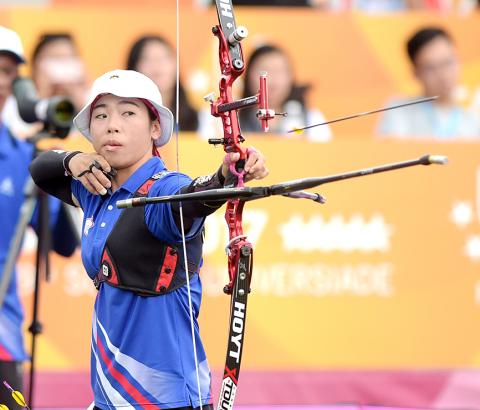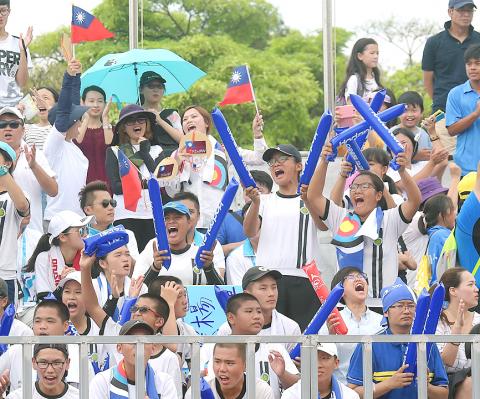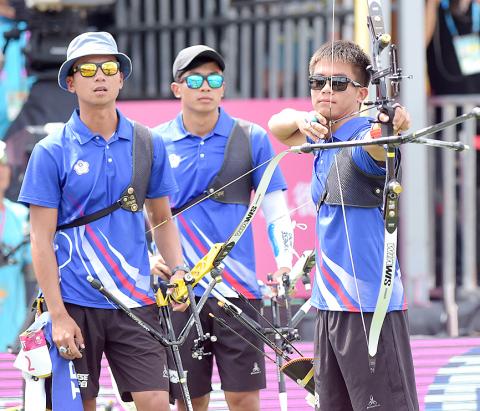Taiwan yesterday claimed gold in the Taipei Summer Universiade men’s 100m sprint, while archers picked up three silvers and there was a bronze in taekwondo.
Yang Chun-han (楊俊瀚) won the gold medal in the 100m final at the Taipei Municipal Stadium with a time of 10.22 seconds, coming off a national record in the semi-finals of 10.20 seconds that marked him as a favorite in the decider at 8:40pm.
Thando Roto of South Africa took silver 0.02 seconds behind, while Cameron Burrell of the US claimed bronze in 10.27 seconds.

Photo: CNA
Yang set the previous mark for Taiwan’s best time over the distance in May.
It was the final day of archery at the Universiade, and Taiwanese were on target, advancing into the medals rounds, but were second best when facing archrivals South Korea.
Tan Ya-ting (譚雅婷), Taiwan’s top female archer, faltered in a showdown against Kang Chae-young in the gold-medal match in women’s recurve individual.

Photo: Huang Yao-cheng, Taipei Times
Kang won 7-4 at the National Taiwan Sport University Stadium in Taoyuan.
In the team finals, there was a recurring theme of South Korean dominance over Taiwan.
In the men’s recurve team final, Taiwan’s Wei Chun-heng (魏均珩), Deng Yu-cheng (鄧宇成) and Peng Shih-chen (彭士誠) shot 56, 54, and 55 respectively in three sets for a total of 165, but South Korea scored 58, 59 and 58 for a 175 total, winning 6-0.

Photo: Huang Yao-cheng, Taipei Times
In the third-place match, Russia took bronze after a 5-1 win over Kazakhstan.
In the women’s recurve team final, Russia defeated Italy 6-0 for bronze, while Taiwan’s Tan, Lei Chien-ying (雷千瑩) and Peng Chia-mao (彭家楙) faced South Korea in the gold-medal match.
Local fans witnessed a thrilling showdown, as the match was tied after three sets and went to 4-4 in the fourth.

Photo: Huang Yao-cheng, Taipei Times
A shoot-off was required, in which Taiwan scored nine, 10 and nine points.
However, South Korea were even better, scoring three 10s to capture gold.
Lei missed out on bronze when Alejandra Valencia of Mexico beat her 6-0 in the women’s recurve individual third-place match.
It was South Korea again in the men’s recurve individual final, with Lee Seung-yun taking home the gold with a 6-0 win over Arsalan Baldanov of Russia.
In the mixed recurve team final, South Korea prevailed over France 5-4.
Head coach Ni Ta-chih (倪大智) praised Taiwan’s archers, saying: “Even though we did not win golds, they have shown their capability and determination to fight to the finish.”
“I give my team a score of 100 for their performance today,” Ni said.
“We feel our team is as good as South Korea,” Tan said. “We have regrets about not seizing our chance to win gold today; we still have room for improvement.”
“This was our first international archery competition at home and although we were a bit nervous, we gave it our best,” Peng Chia-mao said. “During the matches, the three of us [in the women’s recurve team] consulted each other to make adjustments. I think we can be satisfied with the results.”
Yang Tsung-yeh (楊宗燁) added to the nation’s medal tally with taekwondo bronze in the 74kg category.
Yang defeated Alejandro Cuero of Colombia 38-13 first up to get into the round of 16, where he overcame John Asp of Norway 14-10.
In the final eight, Yang scored two points in an extra round against Toni Kanaet of Croatia to advance into the semi-finals.
However, Yang could not get past Scott Ishida of the US, who defeated him 12-6.
“Most of the opponents today were taller than me, so I could not stay back and defend,” Yang said. “I had to take the initiative and attack with different kicks to score points.”
“The audience was cheering really loud for me, so that pushed me to fight on and get a good result,” he said.

CHAOS: Iranians took to the streets playing celebratory music after reports of Khamenei’s death on Saturday, while mourners also gathered in Tehran yesterday Iranian Supreme Leader Ayatollah Ali Khamenei was killed in a major attack on Iran launched by Israel and the US, throwing the future of the Islamic republic into doubt and raising the risk of regional instability. Iranian state television and the state-run IRNA news agency announced the 86-year-old’s death early yesterday. US President Donald Trump said it gave Iranians their “greatest chance” to “take back” their country. The announcements came after a joint US and Israeli aerial bombardment that targeted Iranian military and governmental sites. Trump said the “heavy and pinpoint bombing” would continue through the week or as long

TRUST: The KMT said it respected the US’ timing and considerations, and hoped it would continue to honor its commitments to helping Taiwan bolster its defenses and deterrence US President Donald Trump is delaying a multibillion-dollar arms sale to Taiwan to ensure his visit to Beijing is successful, a New York Times report said. The weapons sales package has stalled in the US Department of State, the report said, citing US officials it did not identify. The White House has told agencies not to push forward ahead of Trump’s meeting with Chinese President Xi Jinping (習近平), it said. The two last month held a phone call to discuss trade and geopolitical flashpoints ahead of the summit. Xi raised the Taiwan issue and urged the US to handle arms sales to

State-run CPC Corp, Taiwan (CPC, 台灣中油) yesterday said that it had confirmed on Saturday night with its liquefied natural gas (LNG) and crude oil suppliers that shipments are proceeding as scheduled and that domestic supplies remain unaffected. The CPC yesterday announced the gasoline and diesel prices will rise by NT$0.2 and NT$0.4 per liter, respectively, starting Monday, citing Middle East tensions and blizzards in the eastern United States. CPC also iterated it has been reducing the proportion of crude oil imports from the Middle East and diversifying its supply sources in the past few years in response to geopolitical risks, expanding

Pro-democracy media tycoon Jimmy Lai’s (黎智英) fraud conviction and prison sentence were yesterday overturned by a Hong Kong court, in a surprise legal decision that comes soon after Lai was jailed for 20 years on a separate national security charge. Judges Jeremy Poon (潘兆初), Anthea Pang (彭寶琴) and Derek Pang (彭偉昌) said in the judgement that they allowed the appeal from Lai, and another defendant in the case, to proceed, as a lower court judge had “erred.” “The Court of Appeal gave them leave to appeal against their conviction, allowed their appeals, quashed the convictions and set aside the sentences,” the judges